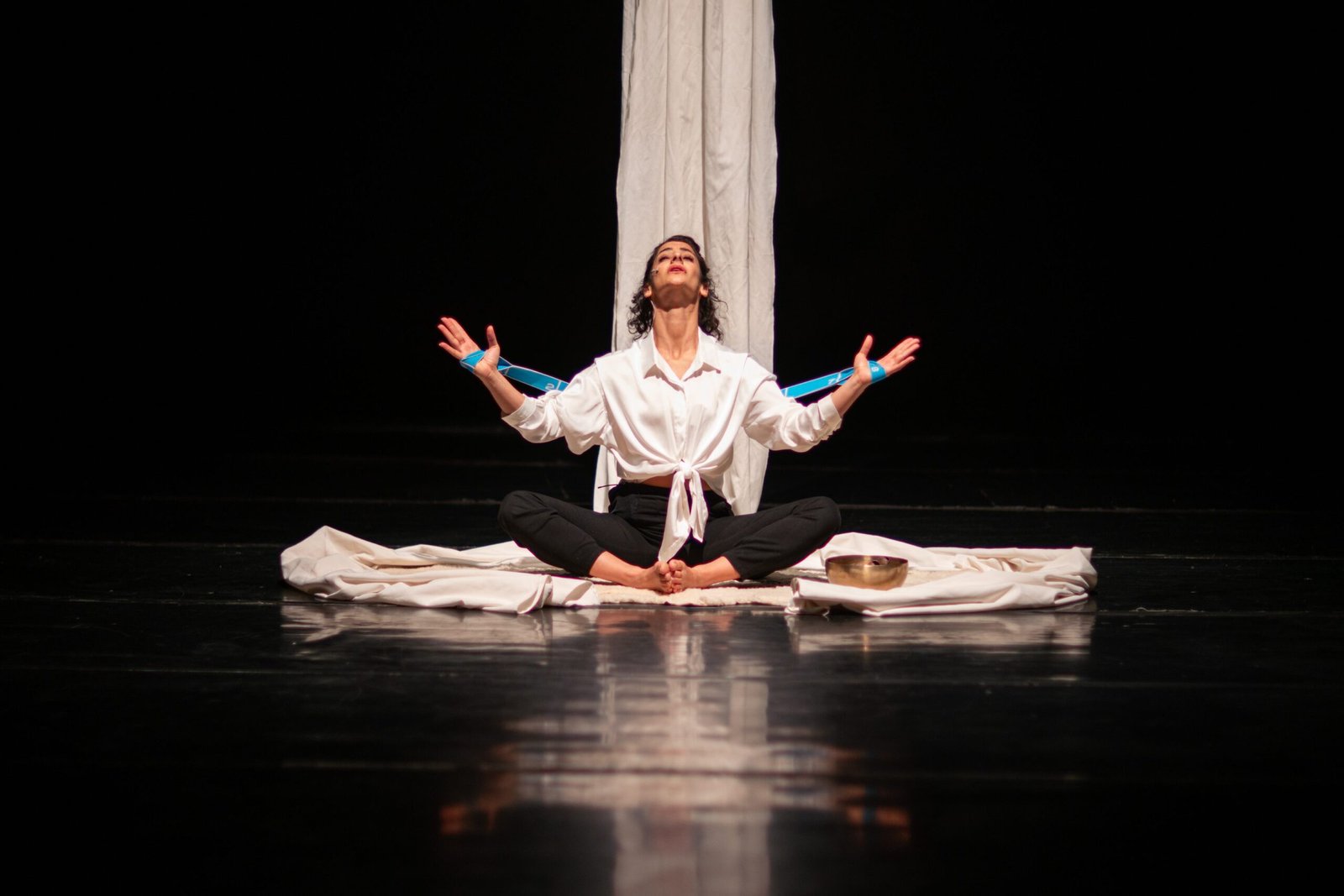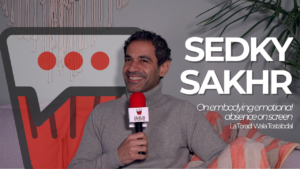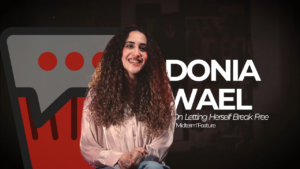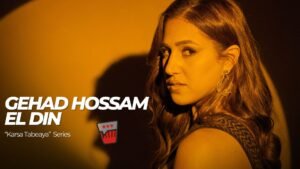With our coverage of D-CAF, we had the chance to interview Ashtar Muallem, a remarkable Palestinian-French artist whose talent knows no bounds.
As we eagerly anticipate her upcoming show, “Cosmos,” set to grace the stage at D-CAF on November 5th, we delve deep into the creative mind of a multidisciplinary artist whose work transcends boundaries and challenges societal norms.
In this conversation, we explore the essence of her upcoming performance, her artistic journey, and the profound impact of her craft amidst the challenging backdrop of Palestine’s socio-political landscape.

Ashtar, could you provide us with a glimpse into your upcoming show, ‘Cosmos’? What inspired this performance, and what can audiences expect to witness on November 4th at D-CAF?
In cosmos, I revisit my memories with my grandmother, who raised me in my hometown Jerusalem, when I was a young girl. I quickly go through the history of the occupation of Palestine as I would explain it to my friends in France where I live today.
I share about my life today in exile far away from my country, my family, and my language. I share with the audience my quest for connectedness and my spiritual search to connect with the divine.
I recall the period when I was in desperate need to be connected to something that feels familiar and comforting in my solitude in my exile but I share my stories in a very humoristic way that makes the audience laugh regardless of the heaviness of some of the subjects.

Your performance in “Cosmos” is a personal journey that incorporates elements like yoga, meditation, tarot, and auras. Could you tell us more about how these experiences and practices have influenced the development of the show and your artistic expression?
Just before Clement Dazin invited me to work together on this performance. I had spent months alone in my apartment in Marseille that I had just moved into. I had no friends in my new town and my family was across the continent in Palestine.
I had so much sadness in me and many questions about how my future whether it would be better or not. I needed clear answers from a trustworthy source like God. I searched for my answers on the Internet and even looked for videos on YouTube.
There I have found so many people who preach about different subjects, and who would speak to me and comfort me while I carry on with my daily life. I stumbled upon tarot reading videos that were very soothing at the time and quickly, I became addicted to them.
I would keep YouTube on like the radio and listen to these tarot readings on and on in the loop. They promised me that the future would certainly be better. One thing led to the other, and I started searching for more well-being videos, talks, and master classes.
I even started reading new age books and discovered that I am probably a spiritual person searching for a higher power that could comfort me. Much later I noticed that I have become addicted to these sources of inspiration and comfort, and they have become just as dangerous as any other substance or idea that one can get blindly attached to.

As a multidisciplinary artist working at the intersection of circus, dance, and theatre, how do you navigate the creative challenges and opportunities that arise from merging these different art forms in “Cosmos”?
have never been more drawn to one artistic practice than another, and always felt the power of merging these arts. My first background is in dance and theatre and Circus came later on in my life after I graduated from high school.
When I understood how my circus discipline can be incorporated in my acting and dancing I understood that it can be an element of surprise and impress. The creation of cosmos in its first version in the French language, was pretty and easy.
Clement and I came up with the show in three weeks only. I had a baggage of material and stories that I proposed and Clement wanted me to be minimalistic with the technical performative aspect. We both decided to give an important place for the text. In this show, I believe that the power lies in the combination between the physical performance and the text that accompanies it from beginning to end.
Later this year, I worked on the Arabic version of the show with the Director, Emile Saba, and Palestine. This is the version I will be performing here in Cairo and Alexandria. It is based on the original French version but with a new twist in the text and some modifications to the direction. The second part of work to create the Arabic version equally took Saba and me three weeks of work.
Audience interaction is a significant aspect of “Cosmos.” How do you engage with the audience during the performance, and why is this interaction important to the show’s overall experience?
The language connection with the audience like in stand-up comedy shows is new to me. I establish the first contact with the audience as they enter into the theatre space. Then I keep, addressing them all through the show to involve them in my story and to Make them feel that we are also connected by the experiences and the feelings I am addressing on stage.
“Cosmos” was created in partnership with Clément Dazin. What was the collaborative process like, and how did you bring your respective talents and experiences together to create this show?
Clement and I have known each other for 13 years as we have done the same Circus School together in Chalons En Champagne in 2010. Already when I was at the Circus School I always spoke about Palestine in real life, and my performances. Fast forward to 13 years later, Clement invited me to work on a collective show with five of our previous classmates.
Within the first residency of our new creation, I was proposing so much material that intrigued Clement. This caused him to ask me to work together on another show in parallel to the collective where I am alone on stage. As a Director Clement is a good listener and sensitive to the ideas proposed by his actors. His poetic and humorous way of viewing life adds a new layer to the proposed material. He has the eye to select what works on stage and what doesn’t.
As a performer and a creator, I have a very fertile imagination and propose a lot of material during creation periods. I gave Clement a lot of raw material to work with and it was fun for both of us to brick our ideas together, and create a performance that reflects our artistic approaches. Clement was able to create the frame for me to paint inside.
In this creation, I learned through working with Clement that I can speak of deep issues while being light and humorous. That I can actually be funny on stage! And this is a great discovery, which has given me a lot of self-confidence as a performer. I love being able to connect with the audience through my personal story through the laughs and cries with subtle and dark humor.
How has your international experience influenced your artistic perspective, and what do you think global audiences might appreciate most about “Cosmos”?
My international experience has greatly affected my artistic perspective and performance because I have nourished it by working with different directors in different countries over the past 12 years.
I had the chance to work with Palestinians, Belgian, French, Swedish, and multinational directors and artists and learn from them how they defend their own ideas on stage.
I have acquired new tools that I use and implement in my work. in this show in particular, I believe that the main influences came from my memories, my childhood desires, and my recent desires as an artist on stage.

Given the socio-political climate in Palestine, performing amidst challenging circumstances requires great resilience. Can you share the challenges you faced and how you approached performing in such sensitive times?
In this time in particular I think that performing my art is the best thing I can do. Each one of us has to fight from our own places in society, and our own knowledge through the things we master the most. I was paralysed mentally in the first three days of the war in Gaza and on Palestine because of the shock and disbelief.
But quickly I was reminded by my friend that I am privileged to be outside of Palestine at this moment in time and that I was somehow “chosen” to be outside of Palestine to speak about what’s going on in my country with more liberty.
This brought me to feel that I am in a power position rather than in a weak one. When I got into this mindset I was able to act more efficiently than I thought I would in the first place. I have done different actions since the beginning of the war, a happening in the streets of Marseille, I have given interviews and spoken about Gaza to many people and today I am in Egypt to speak about my country in the way I master most.
Finally, could you tell us about the significance of presenting “Cosmos” at D-CAF, and how do you think the local audience in this context will connect with the show?
To me, it’s of utmost importance to actively engage with the Arab cultural landscape and have the opportunity to travel to neighboring Arab countries, where I can meet their people, establish connections, and showcase my artistic talents.
I firmly believe that we all share common concerns, whether they pertain to culture, politics, or society. Being in Cairo today is a tremendous privilege for me, especially since it marks my first visit to Egypt. I’m delighted to share a piece of my narrative with the Egyptian audience.
Despite our geographical proximity, the numerous travel restrictions between our nations pose a significant barrier. If I didn’t possess a French passport, I wouldn’t have been able to make this journey to perform for the dear Egyptian audience.





